According to MIT Technology Review, data centers could consume up to 945 terawatt-hours annually by 2030, which is roughly equivalent to Japan’s entire electricity consumption. The author argues against putting the onus on individuals to reduce their AI usage, drawing parallels to how BP popularized the carbon footprint concept to shift environmental responsibility from fossil-fuel companies to consumers. This framing effectively moves the burden of worrying about environmental impacts from corporations to individual actions. The piece suggests letting chatbots handle tasks like vacation planning or recipe ideas without guilt. The core argument is that focusing too much on individual behavior distracts from larger systemic solutions needed to address AI’s energy consumption.
Why the big picture matters
Here’s the thing: we’ve seen this movie before. The carbon footprint concept worked brilliantly for oil companies because it made everyone feel personally responsible for a problem that requires systemic change. Now we’re seeing the same pattern with AI energy concerns. Should you really feel guilty about asking ChatGPT for recipe ideas when data centers are consuming energy at scales comparable to entire countries?
I think the author makes a crucial point about where responsibility actually lies. Our entire digital infrastructure is built around energy-intensive computing, much like how our physical infrastructure depends on fossil fuels. Individual actions matter, but they’re drops in the ocean compared to what happens when companies innovate and governments implement smart policies.
Where the real solutions lie
So what actually moves the needle? Political action, public support for better technology, and corporate responsibility. We need companies to develop more efficient AI systems and data centers to adopt cleaner energy sources. That’s where the meaningful change happens – not in whether you let a chatbot write your poem.
Look, the energy concerns around AI are real and deserve attention. But focusing on individual usage feels like rearranging deck chairs on the Titanic. The conversation should be about accelerating renewable energy adoption, improving data center efficiency, and creating policies that encourage sustainable AI development. When it comes to industrial-scale technology challenges, whether we’re talking about data centers or manufacturing systems, the solutions require industrial-scale thinking and the right hardware infrastructure to support efficient operations.
Basically, use AI without guilt. The real work needs to happen at levels far beyond individual choices. And that’s probably where our collective energy should be focused.




